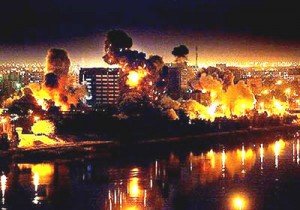(Published in the Truman Doctrine Blog, part of a series of 250 word entries on how the Iraq War shaped one’s life and ideas)
 Back in 1990, in the run-up to the Gulf War, I was a naval officer, and like most of the world, supported the need to use military force. As a student of history, I understood that force is sometimes necessary in the face of aggression.
Back in 1990, in the run-up to the Gulf War, I was a naval officer, and like most of the world, supported the need to use military force. As a student of history, I understood that force is sometimes necessary in the face of aggression.
By 2003, I was a lawyer, and like much of the rest of the world, I viewed the invasion of Iraq as unnecessary, unwise, and unlawful. The Bush administration’s rationales shifted from “preventative” self-defense against Iraq’s WMD, to resurrection of the U.N.’s authorization to use force in the Gulf War, to claims of links to Al Qaeda and 9/11. In the absence of WMD, the government even stooped to advancing human rights justifications for the attack. None were valid.
I was not directly affected by the war, but I was increasingly disturbed by the developments in Iraq, and the so-called “global war on terror” to which it was inextricably linked. The hundreds of thousands of civilian dead, Guantanamo Bay, Abu-Grahib, the torture memos, targeted killing – and all distorting the law and eroding the rule of law, at home and in the international system.
These contributed to my decision to leave practice and head back to school to research the legal constraints on the use of military force. I became a law professor. So in this way I suppose the war helped shape my life’s path. And I strive for a time when such unjust wars will be more difficult for democratic governments to wage.
